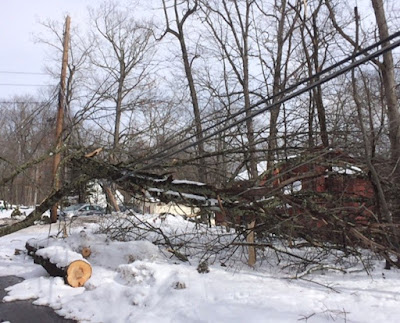The annual report details performance benchmarks and standards for the state’s 11 electric distribution companies, including Citizens’ Electric, Duquesne Light, Metropolitan Edison, PECO, Pennsylvania Electric, Pennsylvania Power, Pike County Light & Power, PPL Electric Utilities, UGI Utilities, Wellsboro Electric and West Penn Power.
According to the report, there were 50 reportable outage events during 2017-- the highest number since PUC began collecting data in 1993, and a substantial increase from the previous year, when only 20 outage events were reported.
The size and scope of those storms is also noteworthy, with 2017 storms disrupting power to 1.3 million customers – which is nearly twice the figure for 2016 and more than double the 2015 total.
Under the Public Utility Code, an outage event is a service disruption involving 5 percent of total customers or 2,500 customers, whichever is less, for six or more consecutive hours.
Nearly all the 2017 outage events were triggered by severe spring and summer thunderstorms, which brought extremely high winds and heavy rain.
This is different from previous spikes in outage figures that were driven by a small number of high-impact storms like Hurricanes Irene (2011) and Sandy (2012), or Winter Storm Nika (2014).
Tree Maintenance
The continuing reliability challenge posed by trees, including trees located outside the utility right-of-way, is noted in the report – as is the impact of increased storm activity.
Overall, approximately 50 percent of the total minutes of service interruptions during 2017 were attributed to fallen trees or tree limbs-- 400 million customer-minutes of service interruptions, impacting over 2 million customers.
Recommendations offered by the PUC’s Electric Service Reliability Report include enhanced tree cutting and trimming-related initiatives; the accelerated replacement of aging infrastructure; and implementation of a new formalized and sustainable reliability improvement initiative to promote operational excellence.
Reliability improvement initiatives were originally developed successfully for high-voltage transmission system operations in areas such as reliability, resilience, security, human performance, equipment performance and asset management, operating experience exchange and superior practices, and continuous performance improvement processes and training.
The specific recommendations related to tree maintenance include--
-- Consider a call for legislative relief that will grant utility companies the authority to remove or trim danger trees that are off their existing right-of-way. Such relief could be the ability to establish a wider right-of-way or allow utilities the authority to trim or remove trees that can potentially fall onto power conductors.
-- Local authorities and counties could work with EDCs to be more proactive identifying and removing danger trees that are diseased or leaning that can fall onto roadway.
-- EDCs and stakeholders could develop a partnership on a long-term program to ensure only the “right tree in the right place” can be planted within 60 feet of primary electrical conductors.
-- Stakeholders could work together on removing dense/mature tree growth entangled in communication lines.
-- Landowners should be more proactive in removing diseased or leaning trees near roadways.
Click Here for a copy of the Reliability Report.[Note: Each utility has a vegetation management program related to its power lines. If you have questions, contact them directly. Click Here for links to utility websites.]
Related Story:
PUC Releases Summer Readiness Reports From Electric Utilities, PA Added 1.247 Gigawatts Of New Electric Generation


No comments :
Post a Comment